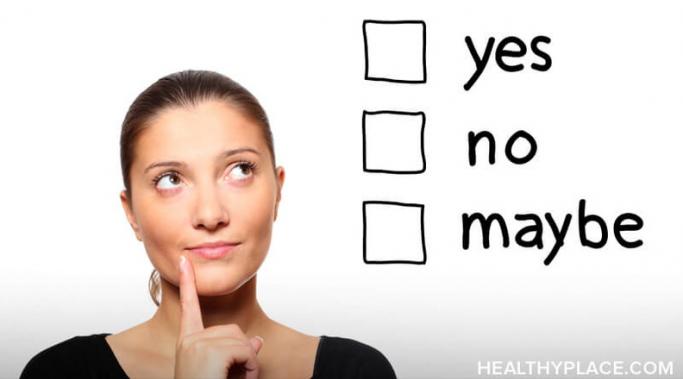Blogs
35 years at Southwestern Bell/ AT&T, and struggling to make ends meet.
40 years as a union rep and labor foreman for a large highway construction company and his entire pension could be affected by whether there is a contract from the current negotiations.
33 years at Chrysler and faced with the decision to move or take a questionable buyout. Spending years saving in order to “retire early”, and then finding himself with nothing to do.
These are the stories I’ve recently heard from people who DO have a positive work ethic. Men and women who have shown loyalty to their employers for decades only to find themselves lost at the end of their careers. When my mother retired at 62 my father-in-law warned her, “Watch out, the first year is hard.”
It's bad enough to be a trauma survivor with symptoms of borderline personality disorder (BPD). However, sometimes people hurt us further when we reach out for help--this is called "secondary wounding".
Early in my relationship with my ex-husband, Will, I felt afraid in his presence. I've often wondered why I stayed with him in these early days. My boyfriends before him generally treated me well - very well. I'd known no one like Will before. He seemed exciting and different. I think my curiosity got the best of me; by the time I'd figured him out, we were entrenched in the cycle of abuse.
I think this episode I'm sharing today illustrates what was going on in my head during our earliest abusive interactions. As you will read in the story, Will and I firmly attached ourselves together very quickly. This story happens before he asked me to be his girl.
Addiction, as the saying goes, is a feelings disease. Whenever I used to find myself feeling a certain way, say depressed, angry, upset, etc., I would find a way to use some kind of chemical to alter my emotion. In the end, it didn’t matter how uncomfortable I felt. I knew that all I had to do was to get high, and voila, that would do the trick. Addiction, a feelings disease, begins in part by being uncomfortable with what you're feeling.
As I wrote, some people believe that if you don't have a mental illness, you can't understand someone with a mental illness. I'm not sure this is true.
I have been writing about mental illness for almost a decade now and part of the reason was to try and help people understand bipolar disorder and other mental illnesses. And I have succeeded in some regards. I get emails from people quite frequently that tell me how much more they understand about the disease now that they have read my writings. I am tremendously gratified by this.
But, of course, I reach a tiny percentage of people and the issue of mental illness stigma still affects us all. And some people, no matter how hard we try to explain ourselves to them, never seem to understand mental illness.
Which begs the question: can a person without a mental illness ever really understand what we’re going through?
Living with a mental illness often involves certain things--particularly if you're not stable: More time in bed, closed blinds, not enough food in your fridge or too much "bad" food in your cupboard. Isolating yourself. Creating a negative environment. When you're recovering from mental illness, creating a positive environment can help you recover.
For someone who speaks so candidly about his experiences with mental illness, it may come as a surprise to find out that I used to go to extremely great lengths to ensure that no one ever found out about my mental health struggles. In fact, it has only been a few months since I started being open regarding my battles with psychosis, major depression, addiction and suicide attempts.
I use the word “doctor” quite liberally and often use it interchangeably with “psychiatrist.” The reason is quite simple – psychiatrists are, in fact doctors, they are just specialists. Yes, that’s right, your psychiatrist has all the rights and privileges that any other doctor has and could probably remove your spleen, if the occasion called for it.
Nevertheless, there are some crucial differences between “doctors” in general and “psychiatrists” in particular. And sometimes you need a psychiatrist and sometime any old doctor will do. So how do you know if you need a psychiatrist?
This is the golden age of political correctness, and for the mentally ill in our midst, it simply couldn’t happen soon enough. Horrible slurs like porridge-head, cracker academy graduate, and el whackadente have been replaced by culturally sensitive terms such as, unreality-enabled, extra-normal, and sanity-challenged.
But removing the fangs from common speech is just the beginning. Increasingly there is sensitivity about what questions may be considered appropriate to ask a person wrestling with mental illness. Here are just a few of the most common of them, now considered intrusive, prejudicial, stereotypical, and rude.
1. Why don’t you just get over it?
2. Is what you’ve got really a disease, or it is it just a character flaw?
3. Did you ever try growing up?
4. Why is there a duck on your head?
5. Have you looked into Scientology?
I’m glad to report that the use of knee-jerk, judgmental questions like these is on the way out. But my feeling is, why stop there? Now that we’ve built up a little momentum, let’s expand the list of verboten phrases – questions and comments simply off limits when it comes to the mentally ill among us.




![MP900321083[1]](/sites/default/files/styles/blog_listing/public/uploads/2012/06/MP9003210831.jpg?itok=qIqD0HL6)




